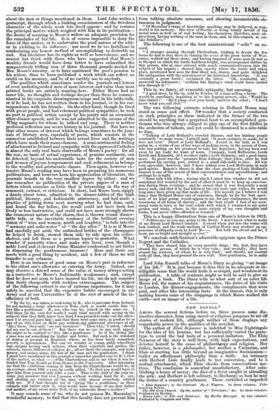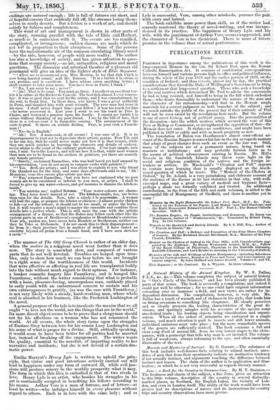NEW NOVELS.*
AMONG the several fictions before us, three possess some dis- tinctive character, from using moral or religious purposes to set off stories of modern life, although neither of them displays any remarkable power in the qualities of the novelist. The author of Elsie Seymour is indebted to Miss Nightingale for the idea of his heroine, but has sufficiently varied the proto- type to avoid the bad taste of a personal imitation. The Elsie, Seymour of the story is well born, with high expectations, and devotes herself to the cause of philanthopy and religion. .Her father, however, is a philosopher, her mother a Unitarian, and Elsie at starting has little beyond an imaginative Socinianism- rather an affectionate philosophy than a faith. An intimacy with Herbert Lisle finally leads to her conversion, and to a midual attachment, which Elsie checks from conscientious mo- tives. The conclusion is somewhat unsatisfactory. After esta- blishing a house of mercy, she dies of a fever caught in attending the sick ; and Herbert is left solitary, to discharge as best he may the duties of a country gentleman. These curtailed or imperfect • Elsie Seymour; or the Contrast. By A. Wygorn. In three volumes. Pub-
lished by Newby.
The Old Grey Church. By the Author of " Trerelyan," &c. In three volumes.
Published by Bentley.
Henry Lyle ; or Life and Existence. By Emilia Hurryat. In two volumes.
Published by Chapman and Hall.
endings are natural enough; life is full of futures cut short, and of hopeful careers that suddenly fall off, like streams losing them- selves in sandy deserts. But a fiction is a work of art, and should satisfy by fulness and completeness. This want of art and management is shown in other parts of the story, running parallel with the tale of Elsie and Herbert, as much as in connexion with it. The events are too ramified, complicated, or incongruous ; sudden chasms are made which do not tell in proportion to their abruptness. Some of the persons have the melodramatic air of the common circulating library novel —by the side, however, of people with more reality. The author has also a knowledge of society, and has given attention to ques- tions that occupy society,—as art, antiquities, religious and moral questions. The discourse and artistical theories of a pleasant old gourmand will give an idea of the lighter style of Elsie Seymour. ", Allow me to recommend you, Miss Monica, to try that dish which is now being handed round,' said Mr. Bateson. 'It is a nub& a la crime et SILT gratins, and is excellent. I have seldom eaten anything better ; I shall venture to take some more. You have been in Paris, I think ? '
" No I am sorry to say ; never !'
" Al;! That is to come. You must go there. I recollect an excellent tur- bot a la creme at the Rocher de Cancule. The best dish almost I ever remem- ber : it was so good that we sent for the artiste, and I was commissioned, by the rest, to thank him. In those days, you- blow I was a great authority in Paris, and thanked him with some warmth. The poor man had tears in his eyes. I shall never forget him—poor fellow ! it was too much for him —he never recovered it. Last year I went to see his tomb in Pere In Chaise, and bestowed a pension upon his family. I cannot see turbot a la creme without thinking of my poor friend. I see by the bill of fare, that there is a vol-au-vent a la fivanciere coming. The arrangement of the carte is good. It shows an artistic feeling. Pray, is your cook a French- man '
" 'No—he is English.'
" Ah 1 Yes. A man-cook, at all events ! I was sure of it. It is no disparagement to your sex to depreciate their artistic genius. Poor Ude said to me one day, that he could never make out how it is that women, while they are much quicker in learning the elements and details of cookery, never attain to the acme of the culinary profession. C'est tout simple, mon ami, I said. Go to the Louvre, and tell me how it is that, while more women than men are to be found in the ateliers de peinture, yet there are scarcely any female painters.'
"" Surely, exclaimed Emmeline, who was half bored yet.half amused by his conversation, you do not mean to compare cooks with painters ? ' " ' Yes. Both are artists; and I was about to explain to you why friend Ude thanked me for the hint, and some days afterwards said to me, Ah ! Monsieur, vous rites encore plus artiste que moi.'
"4 Yes,' returned Emmeline, but you have not explained why we poor women are to be considered so inferior to you men, as artists. I shall be forced to give up my water-colours, and get mamma to dismiss the kitchen- maids.'
" ' You mistake me,' replied Bateman. Your water-colours are charm- ing. They have heart instead of art. The kitchen-maids, too, are better than men for the details. Now take a salade a lit mayonaiae. A woman will boil the eggs, or prepare the lobster or chicken—I almost prefer chicken to fish—or cut the lettuce, it should not be too small, or mince the herbs ; bid it will require a man's mind to master the ensemble and combine these details into a perfect whole. This is still more the case with the artistic arrangement of a dinner, so that the dishes may follow each other lib the various parts in one of Beethoven's symphonies or Mendelssohn's oratorios. Your sex pardon me, have never been Mandela or Beethovens, neither can they be (Ides or Bechamels. I do not speak this to their disparagement— far from it ; theirrovince lies in matters of detail. I have tasted an omelette beyond allp praise from a female hand, and I have seen sketches a ravir.' " , The manner of The Old Grey Church is rather of an elder day, when the motive in a religious novel went farther than it does now. The story is somewhat slow, and composed of various parts that do not well dovetail. Troubles are heaped upon trou- bles, only to show how much we can bear before we are brought to a right sense of the worthlessness of this world. Incidents that were effective or affecting in real life are transplanted bodily into the tale without much regard to their aptness. For instance, a banker commits forgery like Fauntleroy, and is hanged like Fauntleroy, without the writer considering that what is probable with a loose, pleasure-loving, unscrupulous man, suddenly placed in early youth with an embarrassed concern to sustain and his own extravagances to gratify, (as was the case with Fauntleroy„) is not very likely. with a steady, hard-working man, whose whole soul is absorbed in his business, like the Frederick Lushington of the noveL
A general purpose of the tale is to inculcate the maxim that we all ought " to love not the world, nor the things that are in the world." Its more direct object seems to be to prove that a clergyman should not fix his affections on a woman who has not renounced the world. At all events, the whole story turns upon the struggles of Eustace Grey between love for his cousin Lucy Lushington and his sense of what is proper for a divine. Still, critically speaking, it would seem to have been better for all parties had he married her, instead of breaking off the engagement. The writer wants the quality, essential to the novelist, of imparting reality to her narrative and incidents; but she is not devoid of a certain dra- matic power.
Emilia Mariyat's Henry Lyle is written to uphold the prin- ciple, that virtue and good intentions actively carried out will lead to happiness under any form of outward ill, while evil pas- sions will produce misery be the worldly prosperity what it may. The form in which this idea is embodied is that of two rivals in love. Henry Lyle is an artist, who besides his struggles in his art is continually occupied in benefiting his fellows according to his means. Arthur Vere is a man of fortune, and of letters—at least he writes—who indulges himself in every pleasure without regard to others. Each is in love with the same lady ; and as
Lyle is successful, Vere, among other misdeeds, pursues the pair_ with envy and hatred. The book exhibits more power. than skill, as if the.writer had scarcely mastered the theory of novel-writing, and was inexpe • rienced in its practice: The happiness of Henry Lyle and his wife, with the punishment of Arthur Vera; seems exaggerated, and the character of Vere is too theatrical. There is more of future promise in the volume than of actual performance.



























 Previous page
Previous page